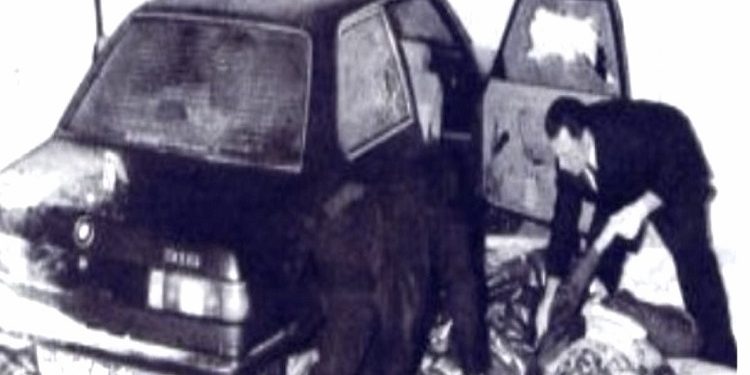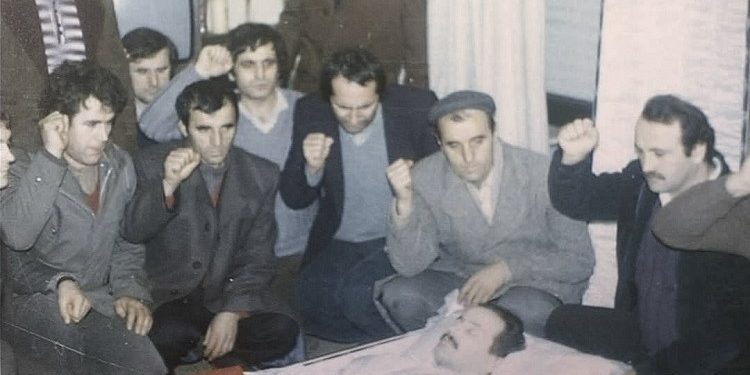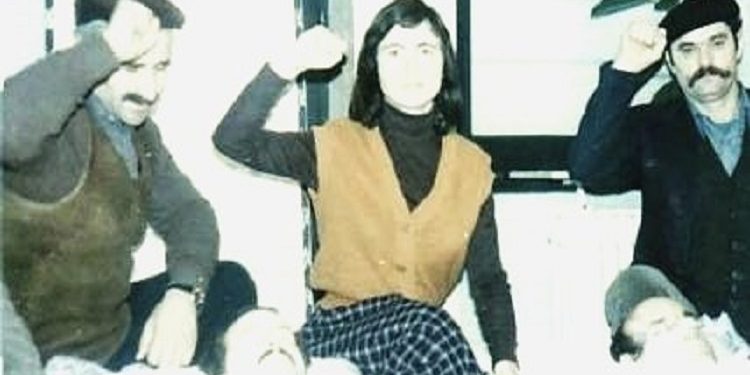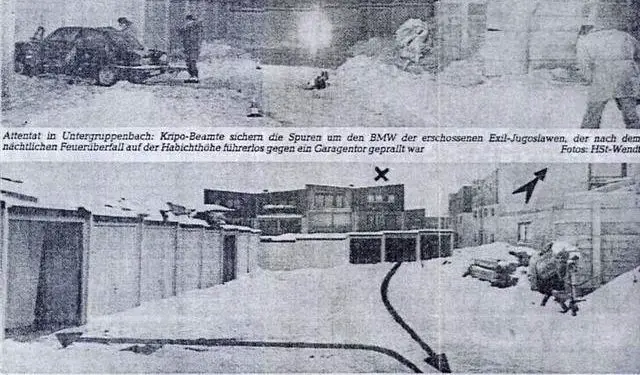By Helmuth Rosebrock
-The role of UDB agent Sali Salihi in the Yugoslav consulate in Frankfurt in the murder of the brothers Gërvalla and Kadri Zeka –
Memorie.al / Unknown persons killed three Yugoslav citizens near Heilbronn. For the German security authorities, this massacre represents a new climax in the secret war between agents of the Yugoslav secret services and opponents of the regime of the multinational state in the Federal Republic of Germany. After the exile of the Croats, the Belgrade government now seems to have declared bloody war on the exiled Albanians from the Republic of Kosovo. The green BMW 316 was backing out of the garage. The driver, due to the snow, did not want to turn around and drove the car in reverse for 40 meters, until he reached an intersection. When the vehicle stopped for a moment under the light of a street lamp, a man emerged from a construction site and fired from about three meters away, inside the car.
A second man also fired, then stood by the car to verify the effect of the shots through the shattered side windows. Neighbors, awakened by the sound of the shots, saw the two men flee. The horrific scene that the residents of “Habichtshöhe” in the Untergruppenbach municipality near Heilbronn witnessed last Monday night: the four-cylinder engine was still running at high speed, the driver still had his foot on the gas pedal. Then, apparently, he released the clutch – he was dead. The car began to spin out of control in a semicircle to the left and crashed into a closed garage door. The driving wheels got stuck in the snow, the engine turned off – and there was silence.
Inside the car, the police found:
The driver Bardhosh Gërvalla, 31 years old. Yugoslav, hit by six bullets, hanging dead behind the wheel.
Assistant police officer Kadri Zeka, 28 years old, killed by two bullets in the upper body.
The driver’s brother, Jusuf Gervalla, 36 years old, seriously injured by two bullets.
“The three victims were quickly identified and also politically classified: Yugoslav citizens in exile, of Albanian origin from the Kosovo Province in the south of the Balkan state, and all three were agitators against the Belgrade government. Even for the competent German authorities, there was immediate information. Only at the scene of the incident, Jusuf Gërvalla, who later died, whispered to the police: ‘This was from the UDB’ – the Yugoslav secret service, Sluzba Drzavne Bezbednosti.
Twelve shots from two pistols – caliber 7.65 – were fired at the three men, ten bullets hitting their hearts, lungs and necks. A policeman on the spot said: ‘It all looks like an execution’!
This was typical secret service method, according to Stuttgart precision shooter and police instructor, Siegfried Hübner – four shots should hit, ‘three to pin the victim or, if he stands on his feet, to knock him down and render him incapable of fighting, then the final fatal shot’. This also pointed towards the UDB.”
“For many years, agents of the Yugoslav secret services and opponents of the regime have been carrying out bloody clashes abroad. On many occasions, Yugoslav militants in exile have violently attacked embassies, consulates and representatives of their country. Belgrade has always responded to murders and terror with the same coin. The scene of these Balkan clashes has consistently been the Federal Republic of Germany, and the police have so far been unable to put an end to these actions”!
“The responsibilities are obvious. Belgrade considers the dedicated groups in exile to be a source of unrest in the multinational state – and fights them. So far, the secret service assassins have mainly turned their weapons against Croats in exile. In several cases of murders of Croats in exile, Belgrade’s involvement has been clearly proven”!
“Example: When the Croat Franjo Goreta, himself a former member of the Yugoslav secret services, on an assassination mission in the Federal Republic of Germany, broke away and was killing a leading officer, Belgrade sent a commando. Almost as soon as Goreta had finished his prison sentence, the UDB men carried out an assassination attempt, from which Goreta narrowly escaped”!
“In the subsequent trial against the three involved, the judge wrote an appeal – so far unheard of – in Bonn, in his decision: ‘It cannot be accepted that on our soil, murder orders that were initiated by foreign states, in order to solve their own internal problems, are being executed.'”
“In addition to the Croats, now also Albanians in exile have entered the goals of the Yugoslav state institutions. Since last spring, when the resistance in the Albanian province of Yugoslavia, Kosovo, turned into bloody riots, Belgrade has identified foreign manipulators. According to Belgrade politicians, the conflict is being directed by the neighboring Albanian state and by communist services loyal to Moscow, but also to a considerable extent by the Federal Republic of Germany”!
“In fact, in Baden-Württemberg alone, there are around 2,000 Yugoslav Albanians living in exile, most of them with political asylum. The Consulate General in Stuttgart has often received complaints about their activities.”
“In the spring of 1981, for example, there was a demonstration by Albanians demanding the separation of Kosovo from Yugoslavia, which otherwise went more or less unnoticed. When the demonstrators noticed that they were being photographed from a house where a Yugoslav school was located, some of them went inside and, in addition to the photographer, also found the Yugoslav Consul General Branko Dimitrijević. They took the film, but were later forced to hand it over to the police.”
“This may have triggered a chain of fatal acts, since one of the intriguers, who was certainly photographed in that film, was Bardhosh Gervalla, the driver killed near Heilbronn”!
“The Gervalla brothers were well-known in the exile scene. Brother Jusufi, who had just declared in an interview for the ‘Tageszeitung’ that he supported the ‘armed war’ against the Yugoslav state, was also, according to police records, the publisher of an exile newspaper called ‘Zëri i Kosovë'”.
“Bardhosh Gervalla had come to the Federal Republic of Germany in 1974. He attended a training course at the Arbeiterwohlfahrt (Workers’ Welfare Organization) of North Württemberg and had long been working in a social care and counseling center for Yugoslav workers at Solitudestraße 44 in Ludwigsburg. Bardhosh, married with two children, was mainly active in trade union and labor rights issues for his compatriots”.
“The political mastermind of the brothers, who in the autumn of 1981 had taken over the house in Untergruppenbach, was undoubtedly Jusuf Gervalla. It was he whom the Yugoslav consulate in Stuttgart officially accused of being a leading member of the ‘Red Front’, an organization that fought against the Yugoslav government. Until then, the organization had been active only in Yugoslavia and, like other groups from Kosovo, had not appeared in the annual reports of the Interior Office and the Federal Office for the Protection of the Constitution”.
“Jusuf, married with three children, was said to be the chief publisher of the banned newspaper in Yugoslavia ‘Zëri i Kosovës’, for which he worked from his place of residence. Kadriu, also a journalist, was a leading collaborator of the same newspaper”.
“On the outer wall of their house at ‘Auf der Habichtshöhe 40’ last week, a red flag with a double-headed eagle and a five-pointed star at half-mast was defiantly placed – the colors of Kosovo and at the same time the national flag of Albania.”
“The importance that Belgrade attaches to the activities of Albanians in exile does not stem only from the Heilbronn massacre. A major operation, with which the Yugoslav security service targeted its compatriot Rasim Zenelaj, at the beginning of last year, clearly demonstrates this. Zenelaj was a leading member and chairman of the ‘National-Democratic League of Albanian Loyalty'”.
“With the pistol shooting of the regime’s opponent, Zenelaj, who survived with serious injuries on May 14 of last year, the new direction of the Yugoslav secret service became clear for the first time”.
“To eliminate Zenelaj, Belgrade hatched elaborate plans, recruited several agents, and even took the risk of involving official members of the consulates in the assassination plot and exposing other high-ranking aides. However, the plan failed and those involved were revealed: In the current proceedings in Frankfurt against those responsible for the attempted assassination of Zenelaj, the involvement of Yugoslav institutions in the murderous persecution of immigrants has once again become horribly apparent.”
“In the late 1970s, a senior secret service figure in the Kosovo city of Uroševac rose to consular rank. Under the name Salih Salihi, he soon appeared in his country’s diplomatic service in the Federal Republic of Germany, first at the consulate general in Hamburg, then at the consulate general in Frankfurt. There he was posted as a guard, equipped with a gray consular permit, no. 6750. Another secret service colleague, Svetozar Mirjačić, nicknamed ‘Tozo’, who, with permit no. 6322, acted as a senior consular official, was already operating in Frankfurt. The top confidant of these two agents was Rade Surla, a former partisan and stationed in Frankfurt as a construction entrepreneur.”
“Surla visited his friends at the consulate and informed them about the activities of people in exile. Once, – as his driver recalls – he himself received a visit. The dark guest (Surla told the driver: ‘We must be careful of him’) was the secret service general, Milan Sašić”.
“As early as March 1981, immediately after the outbreak of unrest in Kosovo, the trio from Frankfurt went into action. Salihi sought information among Yugoslavs in exile about the lifestyle of the Albanian activist Rasim Zenelaj and brought reliable sources to Tozo. Surla also became active when concrete confessions about the murder began. Various traces and witnesses to the conspiracy have clearly shown how brazen and massive the secret service agents had acted”.
“The first agent they deployed against Zenelaj, a Croat in exile, revealed the state’s orders through court testimony. The second agent also made no secret of it: Ante Kujundžić had already been recruited by Tozo as a plotter for the assassination when he told his Croatian friends in exile the truth. The German police soon learned the details of the preparations for the assassination.”
“The authorities did not act with much caution. The Croat in exile Ante Kujundžić was approached in April 1981 in the Frankfurt train station area by an unknown compatriot. He was asked to urgently call an ‘important person’ and identify himself as; ‘the music student’. The unknown then handed him a telephone number – 217701 – and instructed Kujundžić to add the number 2 to each digit when dialing the number.”
“Under number 439923, the Yugoslav consulate answered, and thus contact with Tozo was established. Kujundžić was initially asked to spy on the Albanian in exile, Zenelaj. In return, Tozo offered money, new documents and assistance in obtaining political asylum in the FRG.”
“During a later meeting, Tozo offered a fake passport, in case his partner had to leave the country very quickly, for an important matter. Kujundžić: ‘It was becoming clear to me that I might have to kill someone.’ The agent gave up and informed the German authorities. The police then placed Zenelaj under protection.”
“To show this to the conspirators, the German police once deliberately took Zenelaj in front of the Yugoslav consulate. Another time, during a walk in the zoo, Yugoslav spies observed the Albanian, together with the official companion – and were themselves observed by the Germans”!
“Zenelaj came into danger, only because of his own actions: he told his circle of friends about another protective measure – the police had put a bulletproof vest on him. A person who found out about this worked for the construction entrepreneur, Surla. Thus the Yugoslavs concocted a plan to maneuver their bulletproof opponent into a situation where he would take off his vest. A woman would do this and then fire the fatal shot”!
“A blonde Serbian woman, Zorica Aleksić, was quickly found as an assistant. She lived without income and without work near Darmstadt and was quickly convinced of the plan, through threats and the promise of a reward of 2,000 marks, for murder. A meeting was arranged between the woman and her victim, Rasim Zenelaj, who took the agent to his apartment. When the woman came out of the bathroom with a pistol ready to shoot, he was no longer wearing his protective jacket. Hit by five shots near the heart, Zenelaj fell to the ground”!
“The killer fled and was met at the entrance to the building by Surla and his driver. Zorica Aleksić returned the gun and took her money and a ticket to Belgrade. In a gray Volvo, the three immediately left for Frankfurt airport”.
“But the Serbian woman did not manage to leave the country. Neighbors, alarmed by the shooting, found the victim and called the ambulance and the police. By chance, one of the police officers who were assigned to protect the Albanian, heard the radio communications. A quick search in the circle of the victim’s friends led to Zorica, who was arrested a little later, during a check at the airport”.
“Consulate employees Tozo and Salihi returned to Yugoslavia a long time ago. The contact Surla managed to leave on the evening of the day of the assassination. A telephone warning came, Surla only said: ‘Okay’. Then he asked his driver, who was a witness to the phone call, to take him quickly across the border, to the ‘Holiday Inn’ hotel in Strasbourg. There his trail was lost”!
“The failure does not seem to have discouraged the UDB. A confirmation was found on October 10, 1981 in Brussels: there an Albanian named Vehbi Ibrahimi was killed by several attackers with a 7.65 caliber pistol, on a street in front of his apartment. His wife, who had accompanied him, was seriously injured by the shots. Ibrahimi was the vice president of the Albanian Loyalty League.”
“The German state security police, after the assassinations of Zenelaj and Ibrahimi, now found it necessary to also take care of the protection of the first president of the League, Emir Fazlija. He lived near Göppingen and was known among his neighbors only as ‘a respected and elderly man’. The responsible police expressed concern that; ‘they would kill him too’. Since then Fazlija has been isolated and is no longer reachable even by phone”!
“In the fight against the Yugoslav ‘underground’ war, the police bodies find little political support. Although there is an agreement between Bonn and Belgrade to provide mutual assistance in the event of assassinations. From time to time, data on the origin of explosives and the caliber of weapons is also exchanged.”
“But how little interest at least one party has in reality in cooperation, the assassinations themselves show. For example, for a long time the Federal Criminal Investigation Office noticed that in assassinations against Croats in exile, when members of the UDB were apparently involved, pistols with four-barreled barrels were used, the bullets of which flew with a right-handed twist – most of these weapons fire with a left-handed twist. The organizers of the assassinations did not even consider it necessary to hide this feature”!
“When in 1978, four members of the RAF were captured by the Yugoslav police, the Yugoslavs presented a list of Croats in exile, wanted for a prisoner exchange. The federal authorities refused, and Belgrade released the RAF members”!
“As for the German-Yugoslav cooperation between the police services, the German side complains. Instead of pursuing the culprits, the Yugoslavs often only offered suggestions for motives: ‘A matter of honor’, ‘working with women’, ‘settling scores in the station environment’ or ‘arms trade’, should have been the real cause”!
“The involvement of the Belgrade intelligence services, Yugoslav politicians categorically deny to their colleagues in Bonn. In this spirit, regular talks between the high-ranking officials of the Federal Ministry of the Interior and their colleagues in Belgrade always take place. The Minister of the Interior, Franjo Herljević, a former partisan general and a friend of Tito’s, always denies and claims that the Yugoslav secret services do not operate in the Federal Republic of Germany”!
“In the autumn of 1981, CDU MP Fritz Wittmann received only an evasive answer from the Foreign Ministry when asked about Bonn’s reaction to Belgrade’s behavior. Bonn, – said Minister Hildegard Hamm-Brücher, – only speaks out ‘where there is reason and it is appropriate'”!
“Meanwhile, in addition to various court proceedings, there is also evidence of the UDB’s activities. For example, at the Yugoslav embassy in Bonn, a diplomat was an interlocutor of the German police services, police attaché Tomo Renac, who always sent questions to Belgrade, but never answered them and often simply shrugged his shoulders”!
“The Germans understood the reason for this procrastination when a document from Renac, sent to Belgrade, fell into the wrong hands”!
“In Renac, he complained like an insulted secret service agent: ‘Now they are trying to make the security activities of the Yugoslav state in the Federal Republic of Germany impossible, through criminal and propaganda measures. At a reception, the Bonn police chief even emphasized the espionage activities of Yugoslav diplomats, for which there is evidence, and added that Yugoslav diplomacy in the Federal Republic of Germany acts in a very coordinated manner. This forces us to conclude that the work of our points in the Federal Republic of Germany is becoming increasingly difficult'”!
“Therefore, German investigators do not want to rely on the Yugoslav services for mutual assistance. When a prosecutor in Frankfurt recently announced that in the case of the Albanian in exile, Rasim Zenelaj, he would perform ‘testimony in Yugoslavia’, internal specialists did not give him hope”! Memorie.al














